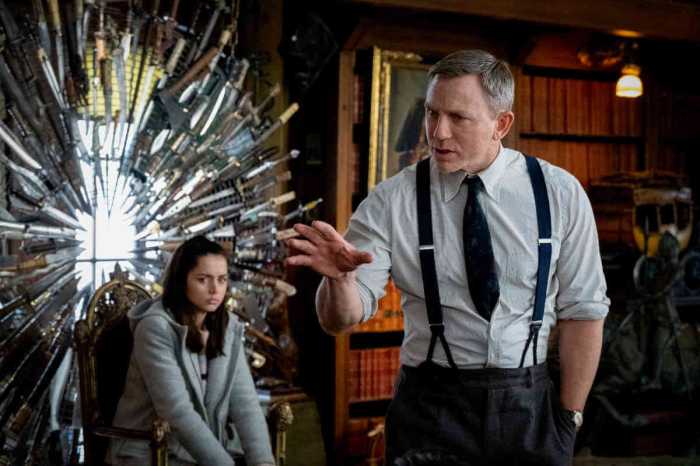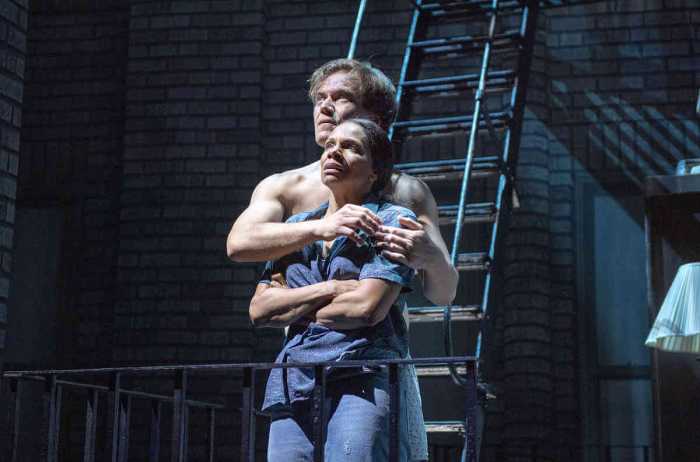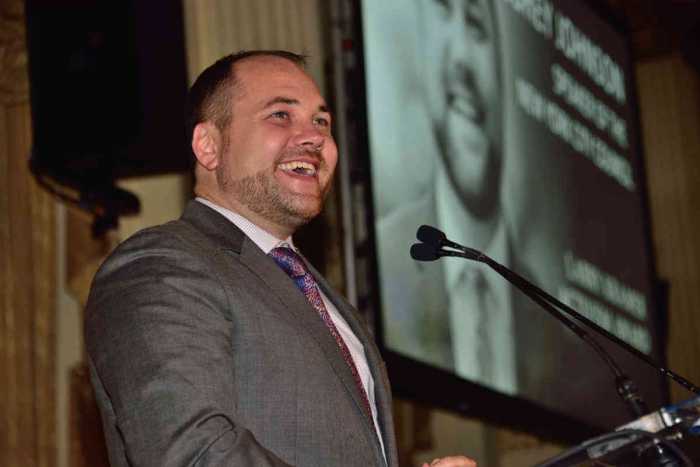The affecting drama “Freeheld” is based on the true story (and 2007 Oscar-winning short documentary) about Laurel Hester (Julianne Moore), a dedicated detective in Seaside Heights, New Jersey, who must fight for justice when, faced with terminal breast cancer, she learns that her legal domestic partner, Stacie Andree (Ellen Page), is not eligible for pension benefits. In the days before civil unions there — never mind marriage equality — domestic partnership offered limited rights and protections, and the elected Freeholders of Ocean County had the power to decide the question of pension benefits for public employees in same-sex partnerships. The county’s refusal to grant Laurel’s pension benefits to Stacie would, after Laurel’s death, likely have forced her out of the home they shared.
The film, written by Ron Nyswaner (“Philadelphia,”) and directed by Peter Sollett (“Nick and Norah’s Infinite Playlist”), chronicles how Laurel and Stacie at first reluctantly but over time emphatically challenge the pension denial. They enlist the help of Steven Goldstein (Steve Carell), an activist who founded Garden State Equality. Laurel’s partner on the force, Dane Wells (Michael Shannon), a straight ally, helps mobilize the fight for equality among her fellow officers.
How the story turns out may not be much of a surprise, but “Freeheld” generates great emotional power — not primarily in the fight for equality but rather in the intimate moments between Laurel and Stacie — on a date or setting up their dream house. Moore and Page are incredibly endearing as a couple.
Ellen Page portrays Stacie Andree in her struggle to be recognized as the surviving partner of Detective Laurel Hester
The out lesbian Page, who plays Stacie as a tough but tender-hearted partner, spoke with Gay City News about making her passion project.
GARY M. KRAMER: You have a producer credit on the film. Why was this story important to be told, and told now?
ELLEN PAGE: I attached myself to this film when I was 21, so it’s been a long time. I was involved pre-screenplay, pre-director, pre-Julianne. I think the film is important now because while the Supreme Court decision is amazing and unbelievable and the progress is astonishing, there is so much more work to do for true equality. In many civil rights movements, there is always some backlash.
I think this film shows why that recent decision is so important. “Freeheld” tells the story in the macro and micro perspectives. How inequality makes people feel: we’re not going to value your love; you are less than us. And the couple’s socio-economic situation has the real impact — especially when we talk about equality in the large political sense. And to convey what that decision means and what discrimination does is to make people feel that they are validated, and what their love is and that it is being respected.
GMK: What emotional buttons does the story press for you and why?
EP: I think I have a similar response to what it means to be together in a relationship that’s closeted. It was exciting to explore that in a slightly more layered way. This wasn’t just a fight about coming out. It is about — Why do we have to live and compromise our love and relationships? I found that in my personal experience. I think telling this story is important because Stacie and Laurel did something crucial in a time of unimaginable difficulty, and I wanted to be a part of telling their story.
GMK: You tend to play tough, determined women, but in “Freeheld,” your character is more passive. How did you approach this character?/
EP: Stacie is a very shy person. You get to know her and she’s incredibly funny and deeply, deeply sensitive. But she’s very quiet. Her journey is powerful. She did not want to invest in the activism at first. Doing so would acknowledge that her lover is going to die. She was doing her job, navigating the insurance companies, and activism. So she didn’t have an opportunity to be vulnerable.
GMK: What sparked with you about Stacie in your meeting?
EP: When I met Stacie, the thing that was most evident is her desire to tell this love story and make that the emotional through-line — her complete and utter dedication to Laurel, to do what she thought Laurel would want. Having the visceral experience of meeting her and sitting with her and hearing her talk about Laurel, and taking me to the spot where Laurel got coffee or where she works. There was something about spending that time with her and connecting emotionally and understanding that experience in a deeper way.
GMK: How did you personally relate to Stacie? Are you into volleyball, motorcycles, and older women? Are you a good dancer, and can you rotate tires in under eight minutes, and are you good with dry wall?
EP: I’m horrible at all things like that. I wish I had more hands-on skills, but I don’t. Motorcycles kind of scare me. Older women are super hot, though. Stacie and I don’t have that much in common. That said, I’d be delighted to have the opportunity to learn some of those skills.
GMK: How did you develop your on-screen relationship with Julianne Moore?
EP: That was fun. What Julianne and I had going for us is we just connected really quickly. I don’t know if she was trying to make me feel more comfortable, but she was all physical, putting her leg and arm around me. We got rid of physical barriers right way, and all the barriers were gone after that. She’s extraordinary, fun, and goofy, and I felt protected by her. We became close and still remain close. We really did form a partnership on screen and off screen, too. I was excited to see her every day. We had our own special bond.
GMK: Laurel has to live a double/ secret life. You had a secret life for a while, too. What can you say about that experience and your decision to come out?
EP: It was the best decision I ever made, wish I had made it sooner. But I had to go on whatever journey I went on. Some people have a risk of being thrown in jail or killed for being gay. For me, being closeted was an incredibly sad and toxic experience, and it got to a point where I was done living like that. It created a ripple effect of happiness in every aspect of my life. Being closeted does affect every aspect of who you are. There are people in the community who are far more vulnerable than me. I want to help them.
GMK: What do you think “Freeheld” says about gay and lesbian stereotypes? The women are in traditional male roles, while Steve Goldstein is very flamboyant.
EP: The film is a true story. In regards to Stacie and Laurel, we did our best with the info we had — pictures, costumes, etc. — to tell the story as authentically as possible. I understand you see a stereotype of a gay man, but that’s the benefit of having the closeted cop in the police office in the film. His coming out is moving. Steve Carell is playing Steven Goldstein a little quieter than he is in real life — and Goldstein is an amazing, passionate man.
GMK: The film is very much about Laurel and Stacie’s dignity, and giving visibility to marginalized people who become citizen-activists. What prompts you to speak up and out?
EP: For me, I’m living my life. I was closeted because of my job. I’m not anymore. My goals and intentions are positive. I’m doing this show [on Vice] called “Gaycation,” where I explore the LGBT communities and issues and difficulties in different countries. It hopefully will create a larger conversation about LGBT communities around the world. I want to talk about more experiences. Trans women of color have life expectancy of 35, and 40 percent of homeless youth are LGBT. Those are troublesome statistics. I want to do what I can to talk about these issues and bring them to the forefront and give visibility to those who are vulnerable.
GMK: The film is about creating a legacy. What do you want your legacy to be?
EP: I feel really fortunate that I can be out. I thought it wouldn’t be a possibility for me to be out and walk down the red carpet with my girlfriend. And considering the pain and suffering that people who don’t have that privilege and luck is to be mindful and conscious of my situation and doing what I can with it.
FREEHELD | Directed by Peter Sollett | Lionsgate Entertainment | Opens Oct. 2 | Landmark Sunshine Cinemas, 143 E. Houston St., btwn. First & Second Aves.; lanmarktheatres.com | Bow Tie Chelsea Cinemas, 260 W. 23rd St.; bowtiecinemas.com | AMC Loews Lincoln Square 13, 1998 Broadway at W. 68th St.; amctheatres.com




































